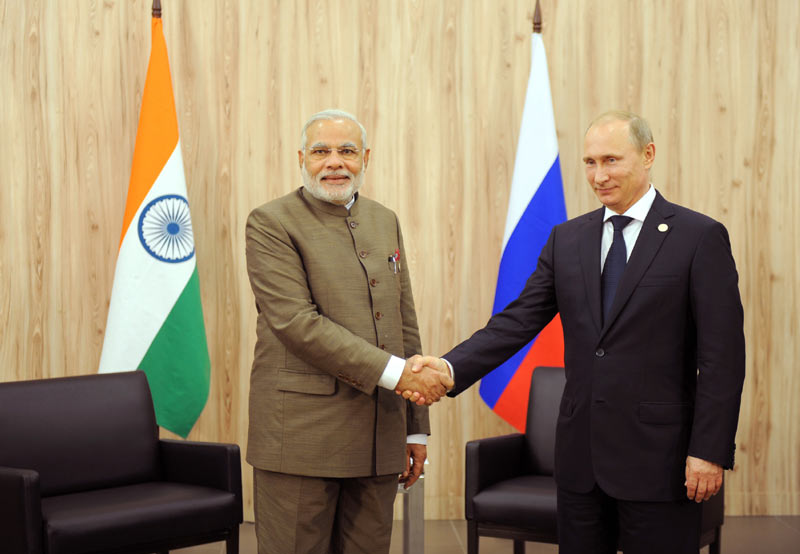Modi urges international community to disrupt terrorist networks and their financing during his Russia visit.

By Yulia Krylova
 On June 1, Prime Minister Narendra Modi and President Vladimir Putin signed the Saint Petersburg Declaration titled “A Vision for the 21st Century,” which condemns terrorism in all its forms and manifestations. As the Declaration states, “there can be no justification whatsoever for any acts of terrorism, whether based upon ideological, religious, political, racial, ethnic or any other reasons.”
On June 1, Prime Minister Narendra Modi and President Vladimir Putin signed the Saint Petersburg Declaration titled “A Vision for the 21st Century,” which condemns terrorism in all its forms and manifestations. As the Declaration states, “there can be no justification whatsoever for any acts of terrorism, whether based upon ideological, religious, political, racial, ethnic or any other reasons.”
The Declaration was signed during the 18th India-Russia Annual Summit held in Saint Petersburg. This summit marked the 70th anniversary of the relations between India and Russia. In 1947, before it became independent, India established diplomatic relations with the Soviet Union. On April 15, 1947, Delhi and Moscow simultaneously published the official statement about exchanging diplomatic representations at the embassy level. It is symbolic that 70 years later, the leaders of the two countries simultaneously published their articles on the Indian-Russian partnership, two days before their meeting in Saint Petersburg.
Modi’s article, published in the Russian newspaper Rossiyskaya Gazeta, states that, “The biggest threat to the civilized community comes from terrorism that is more lethal and more organized today than ever before. Terrorism threatens our way of life. India and Russia are natural partners in fighting terrorism unitedly and with determination to promote a multi-polar international system based on the central role of the United Nations and international law.” In his turn, Putin’s article, published in The Times of India, points to “the enormous potential of cooperation between the two great powers for the benefit of the peoples of India and Russia and the international community in general.”
The fight against terrorism is one area where cooperation between the two countries sets a good example for the entire international community. This cooperation was confirmed at the Saint Petersburg International Economic Forum, where Modi was invited as the guest of honor. In his speech at the Forum delivered on June 2, Modi urged the international community to block funding, weapons sales, and communication support of terrorists. “We should rise above specific incidents. Terrorism is the enemy of humankind. All should come together to fight it,” he noticed.
As a result of Modi’s visit to Russia, the two countries agreed to continue their joint efforts to combat international terrorism, which not only poses a serious threat to global security, but also undermines international economic development. Following the Saint Petersburg Declaration, India and Russia signed a package of agreements aimed at creating joint ventures in the field of transport infrastructure, IT, pharmaceuticals, agriculture, aircraft, auto, and diamond industries, as well as the construction of two new power units at the Kudankulam Nuclear Power Plant in the state of Tamil Nadu. Modi also welcomed Russian companies to join his government’s flagship programs, including Make in India, Start Up India, Skill India, and Digital India.
On June 2, Modi tweeted in his account, “This eventful visit witnessed several programs and fruitful meetings. It will further boost India-Russia friendship.” One of the most important issues on which both Indian and Russian politicians and businessmen agree is that terrorism will remain the key problem for international development in the 21st century. The successful solution of the problem of terrorism is impossible without political and economic cooperation between the world’s great powers. In this respect, the 18th India-Russia Annual Summit and the Saint Petersburg International Economic Forum laid the foundation for a lasting partnership between these countries in all areas, including their joint fight against terrorism.
(Yulia Krylova holds a PhD in Political Science from George Mason University and a PhD in Economics from Saint Petersburg State University. She is currently affiliated with the Terrorism, Transnational Crime, and Corruption Center at George Mason University. )



